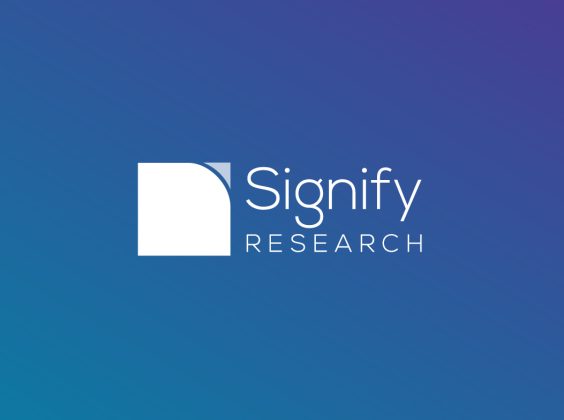
The world market for Electronic Health Records (EHR) and associated software, comprising PAS, clinical, interoperability, PHM and RCM solutions, is estimated to have been worth $23.0B in 2018 and is forecast to grow at a CAGR of 4.4% to $28.6B in 2023. This is according to a new report from Signify Research, an independent supplier of market intelligence and consultancy to the global healthcare technology industry.
Despite the sheer size of the EHR market, it has become increasingly complex at an individual country/ regional level. Differences in healthcare infrastructure, local legislation, varying levels of funding and often unique sets of vendors supplying a given market has resulted in the journey a country takes towards digitising its health records varying significantly. As a result, there are only a few EHR vendors which truly operate on a global scale, with many still having their core EHR business rooted in just one country. This is illustrated by the fact that, of the top 40 global vendors, 30 generated 85% or more of their revenues from just one country in 2018. Vendors that sell in multiple countries have often expanded their geographic footprint via acquisition, easing some of the burdens of ‚Äòregionalising’ EHR software.
Signify Research’s EHR database (comprising 135 vendors), shows that the majority of 2018 revenue was generated from administrative/ operational PAS solutions. However, with most providers having some form of basic EHR installed in most major markets, particularly in the US and other regions with a large installed-base such as DACH (Germany, Austria and Switzerland) and Japan, vendors are increasingly upselling clinical and innovative IT solutions to drive long-term growth. This includes interoperability, PHM/Wellness and RCM modules, which accounted for just over 23% of the global market in 2018. That said there are still significant variations at a country level.
The US was the largest global EHR market in 2018 (with a 64% market share at $14.6B), but growth is projected to fall in the post-Meaningful Use era, meaning new verticals, functionality and international markets will become a key focus for leading vendors. US vendors accounted for seven of the top 10 largest EHR vendors in 2018, with the other three from the second largest market, Japan.
The top four North American EHR vendors were unchanged in the global rankings (compared to 2017), with Cerner, Epic, Allscripts and athenahealth all bringing in over $1B of revenue in 2018. By contrast, the market in Latin America was significantly smaller, with MV Sistemas, Philips Tasy and InterSystems estimated as the top three vendors. In EMEA, Cerner is estimated to have been the market leader, followed by CompuGroup Medical which has a strong foothold in both acute and ambulatory markets. Agfa was the third largest vendor, followed by the market leader in the UK, Emis, the leading Eastern European vendor, Asseco, and the Benelux market leader, Chipsoft. In Asia, the four largest Japanese EHR vendors accounted for 55% of the total market in 2018, followed by a long list of Chinese vendors and international vendors mostly working in Oceania.
While growth in the US market has peaked, many international markets have started to ramp up EHR spend, through either national or regional projects or increased procurement in individual hospitals, ambulatory practices or long-term care organisations. In Oceania, several large State-wide hospital contracts have been won by Cerner, Allscripts and InterSystems. While this is driving the regional market, there are still opportunities for domestic vendors like Telstra Health, particularly in the private acute sector, and other international vendors such as Epic in States that still have decentralised procurement.
In DACH, provider spending has increased on interoperability solutions in order to adhere to the new e-health card frameworks in Germany, while new spending is also being generated from the public payers procuring patient accessible EHRs and hospitals upgrading their HIS solutions to bring together departmentalised legacy clinical solutions onto one platform.
With more than 700 vendors supplying solutions, and with nearly all vendors driving the overwhelming majority of their revenues from one country, the global EMR market would appear very fragmented in terms of supply. However, the dominance of the US and Japanese markets, where there are established and entrenched suppliers, results in the top 10 vendors commanding 62% of world revenues in 2018. The large US market skews many of the global trends. However, the US is a saturated market with vendors battling to take share in order to grow. Geographic expansion offers an alternative. However, it’s one with many pitfalls and vendors need to understand the nuances of local markets if they are to succeed.
About the Report
“EMR-EHR in Acute and Ambulatory Applications – World – 2019” has been compiled by Signify Research using a database based on data from over 135 leading EHR vendors to create a complete bottoms-up view on the market. The robust dataset supplemented with insight gained through in-depth interviews provides an industry leading view into how vendors can better strategise and target 23 major regions. At a country level, the data is broken down in terms of revenues by vertical, product, public/private and vendor market shares. Forecasts are provided to 2023 with the report providing insight into major purchasing organisations/groups driving opportunities, as well as the vendors already serving these groups.
About Signify Research
Signify Research is an independent supplier of market intelligence and consultancy to the global healthcare technology industry. Our major coverage areas are Healthcare IT, Medical Imaging and Digital Health. Our clients include technology vendors, healthcare providers and payers, management consultants and investors. Signify Research is headquartered in Cranfield, UK. To find out more: enquiries@signifyresearch.net, T: +44 (0) 1234 436 150, www.signifyresearch.net
